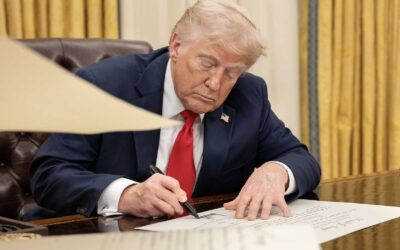US Tariffs and your money
President Trump’s tariffs on imports to the US are part of a “declaration of economic independence”, a bid to bring manufacturing back to the USA.
Tariffs mean increased prices for US consumers when they buy imports. There may be a possibility that it tips America into a recession.
It is important to remember, investing should always be seen as a long-term commitment. While events like new tariffs or market dips can be unsettling, reacting emotionally or making snap decisions can do more harm than good.
In a major development, the US government has announced a 90-day pause on all the “reciprocal” tariffs, except for those imposed on Chinese imports. All other countries that were subjected to reciprocal tariff rates will see rates go back down to the universal 10% rate. This temporary suspension may offer short-term relief to exporters and reduce immediate pressure on global markets. However, the situation remains fluid, and long-term implications are still uncertain. Investors and businesses alike will need to stay alert to further announcements as the 90-day period unfolds.
What is a tariff?
A tariff is a tax added to the cost of goods when they are imported to a country. They are paid by whoever is importing the goods, rather than the manufacturer.
President Trump used them during his first term in office but has now gone much further, arguing that tariffs are needed to level the balance of trade as part of his America First drive, aimed at boosting US firms. It now means sweeping tariffs on the £2.3trillion worth of goods imported to the US every year.
Tariffs lead to higher prices for US consumers but also swell the coffers of the US government. The US is poised to rake in an additional $600billion (£456billion) in tariff revenue. But more important for us in the UK as a major exporter to the US, they discourage international trade.
In a world where trade is the basis of international relations and life in general, that could be a serious problem.
Not only is it suddenly much more difficult to sell anything from farm machinery to Scotch Whiskey to the US, but many other countries will also be imposing retaliatory tariffs on US goods. The overall volume of international trade is likely to be reduced. A trade war could be looming.
Tariffs could cost us all dearly, even if we have never set foot in the US.
What tariffs have been imposed before the 90 day pause?
The effect on UK exports to the US looks stark. There is a generic 10% charge on goods from Britain, which will still have to be paid during this three-month period. But in a bid to protect the faltering US auto industry, imported cars are subject to a 25% tariff and the pause will also not apply. Key British exports are suddenly more expensive in one of their largest markets.
It could have been worse. Imports from the European Union face a 20% levy. Some countries were hit with even steeper import taxes, including Cambodia with 49% tariffs, Laos with 48%, Vietnam with 46% and Myanmar with 44%. China has been hit with tariffs totalling 54%.
Economists are generally united in condemning the move as financially illiterate – but their opinions are unlikely to sway the president’s resolve. It looks as though the era of free trade may have ended.
What does it all mean?
Although the temporary pause may ease immediate market tensions, it does not reverse the underlying trade shift or the potential for tariffs to resume later. Planning for the long term remains key.
President Trump argues that tariffs will encourage US consumers to buy more US goods, helping rebuild the US manufacturing base. In the meantime, American consumers have been warned to expect price hikes as the cost of importing goods increases.
But the effects may spread across the world.
The impact will be felt by all businesses that export to the US. For example, The US is a major export market for cars and nearly 17% of UK car exports went there last year. Big exporters such as Jaguar Land Rover and Mini may be priced out of the market.
There could be similar stories from other industries.
The Office for Budget Responsibility warned that a global trade war - not just on cars - could wipe out Chancellor Rachel Reeves’ £9.9billion of wiggle room, increasing the risk of tax rises and spending cuts.
A slowdown in global trade could increase costs for business. Manufacturers may have to increase domestic prices to keep afloat.
It’s not just rising prices that affect your finances.
The Office for Budget Responsibility had already halved the UK’s growth forecast to 1% this year - and that was before factoring in a global trade war.
The effect on investments has yet to be established – but big falls in the FTSE (and other indices around the world) have wiped trillions off the value of shares.
Tariffs can also lead to what’s known as 'imported inflation'. A weaker dollar and rising costs for raw materials and goods can make imports more expensive for UK companies, which may pass those costs onto consumers. Combined with a volatile pound, this could put extra pressure on household budgets.
Who is affected?
Exporters – the tariffs make the US much less lucrative as an export market. Many businesses could suffer, at least for the short term while they look for new markets.
Investors – including anyone saving for a pension –could expect a loss in the value of their holdings. Drops in stock markets around the world have already happened. For long-term savers, especially those relying on pensions, the knock-on effects could be serious. If tariffs drag global markets into a sustained downturn, the ripple effect could depress pension fund values. That means your retirement savings could take a hit—even if your fund is UK-based.
Workers – Job losses might be inevitable in sectors like the car industry, where sales are likely to be lost. Jaguar Land Rover, with 38,000 workers is already pausing shipments to the US.
Homebuyers – could benefit if interest rates are cut, in a bid to shore up the economy. But there is no guarantee that they will be. The Bank of England could take the view that caution is required and keep rates where they are to try and contain inflation.
Everyone – increased costs of living are the likely result of a global trade war. The return of inflation might make it hard for the Bank of England to cut interest rates, making your mortgage more expensive and further impeding economic growth.
Is there a plus side?
The positive sides of the news are hard to find, but they do exist.
It appears pharmaceutical exports from the UK to the US - a highly lucrative trade - will stay tariff free.
Being outside the EU means that the tariffs on UK goods are lower. The 10% tariff could make the UK a launchpad for foreign companies to export goods to the US. That could mean they invest in factories and other operations here. That could be especially worthwhile for EU companies, which have been hit with tariffs of 20%.
The dollar has also weakened against the pound - and other currencies - in the wake of the announcement. This makes it cheaper for UK firms to import goods that are priced in dollars, which includes those from the Far East, as well as oil.
There is an outside chance that global recession could actually cause central banks to prop up struggling economies – by cutting interest rates.
What can you do?
We're navigating through unpredictable financial waters, with the global economic landscape shifting daily.
If tariffs contribute to higher inflation, central banks may tighten monetary policy, which can increase borrowing costs. This could impact everything from mortgage rates to corporate investment, slowing economic growth.
Inflation could spike, while the value of investments could fall.
On the other hand, there could be many new trade agreements to which the US is not a partner. South America and Africa could both have rising economies that could help replace the US.
It looks as though every aspect of your financial planning could be affected, from your objectives, the calculations about how your wealth will grow, to the choice of investments you need to grow them
But while there is nothing that you can do that will affect the edits coming from the White House, there is plenty that you can do to keep your own financial outlook positive.
You may need to look at your investments, and how your pension is invested. You may need to think carefully about your mortgage, and the costs involved. You may even need to look at your financial security and think about protection against a job loss if there is a downturn.
If global tensions escalate and markets remain unstable, UK policymakers may be forced to make tough calls—such as hiking interest rates or delaying tax cuts. Both could impact personal finances, from mortgages to the real value of your savings. Forward financial planning becomes not just sensible—but essential.
While these developments may feel distant, their impact could hit close to home—especially for those planning for retirement or navigating mortgage renewals. Speaking with a professional adviser now could help you build a more resilient financial plan, ready for whatever the global economy throws your way.
A sensible solution could be to take a fresh look at all your economic arrangements without delay, to understand the impact of the tariffs on them – and to make appropriate adjustments accordingly.
Markets will always experience periods of volatility, but historically, they recover and grow over time. Staying focused on your long-term goals—and not on short-term noise—is often the most effective strategy. At Continuum, we help clients plan for the future with calm, considered investment decisions that aren’t driven by headlines.
To get a full understanding of your financial outlook in the new, Trump-dominated world, and to find new ways to help improve it, call us at Continuum today.
Donald Trump's tariffs: What his bombshell move means for the UK and your money
PwC comments on the impact of US trade tariffs on the UK automotive sector
UK's 2025 growth forecast halved to 1.0%, OBR says
Trump tariffs list: See all the tariffs by country - BBC News
The information contained in this article is based on the opinion of Continuum and does not constitute financial advice and you should seek independent financial advice before embarking on any course of action.
The value of an investment can go down as well as up and you may get back less than you invested. When investing Capital is at risk
A pension is a long-term investment; the fund value can go down as well as up and this can impact the level of pension benefits available. Pension Income could also be affected by interest rates at the time benefits are taken. Pension savings are at risk of being eroded by inflation.
Your home may be repossessed if you do not keep up repayments on your mortgage.
The Financial Conduct Authority does not regulate taxation advice.
Past performance is not a guide to future performance and should not be used to assess the risk associated with the investment.


